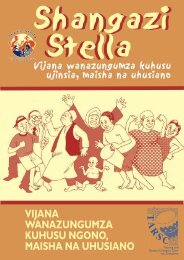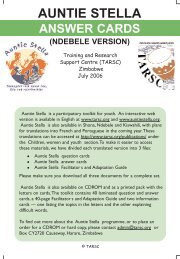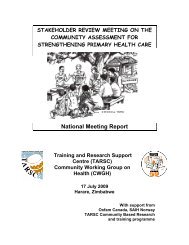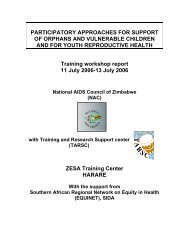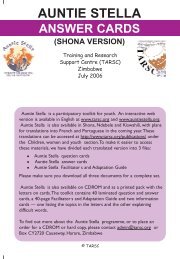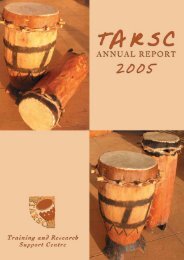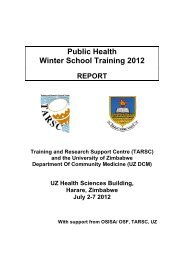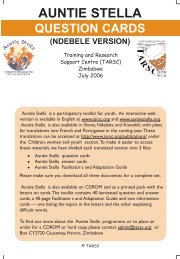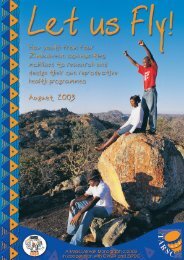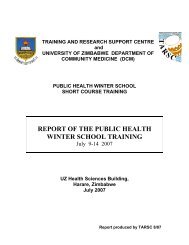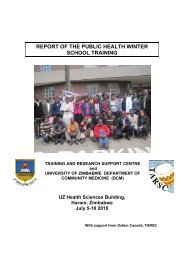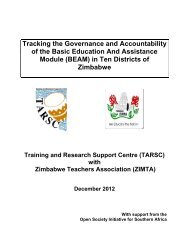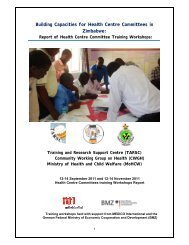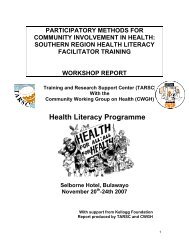HLregional meeting09.pdf - Training and Research Support Centre
HLregional meeting09.pdf - Training and Research Support Centre
HLregional meeting09.pdf - Training and Research Support Centre
Create successful ePaper yourself
Turn your PDF publications into a flip-book with our unique Google optimized e-Paper software.
Executive Summary<br />
The importance of grassroots social movements, or “change from below,” in the history of the health<br />
Literacy programme is a critical one. Revitalization of Primary Health care invests in the central role<br />
of the people as both the primary beneficiaries <strong>and</strong> active participants in the national Health<br />
systems. Health Literacy processes in the East <strong>and</strong> Southern African Region are initiated, run <strong>and</strong><br />
led by common man, vulnerable social groups <strong>and</strong> communities more concerned about defending<br />
<strong>and</strong> protecting their right to health. The programme focuses on both immediate, incremental changes<br />
<strong>and</strong> transforming the health care system into primary health care oriented people centered health<br />
systems.<br />
<strong>Training</strong> <strong>and</strong> <strong>Research</strong> <strong>Support</strong> <strong>Centre</strong> (TARSC) has implemented the regional health literacy<br />
programme in 2006-2009, in co-operation with Community Working Group on Health (CWGH)<br />
Zimbabwe, Malawi Health Equity Network (MHEN), Botswana Network of Ethics, Law <strong>and</strong> HIV <strong>and</strong><br />
AIDS (BONELA) <strong>and</strong> Botswana Federation of Trade Unions (BFTU) with support from Kellogg<br />
Foundation. Health Literacy refers to people’s ability to obtain, interpret, <strong>and</strong> underst<strong>and</strong> basic health<br />
information <strong>and</strong> health services, <strong>and</strong> to use such information <strong>and</strong> services in ways that promote their<br />
health. The Health Literacy Programme aims to support the development <strong>and</strong> use of participatory<br />
health education materials for health<br />
civil society working at community level. The Health Literacy programme is building core public<br />
health skills in civil society facilitators, in actions on health issues at community level, at national<br />
level <strong>and</strong> at regional level. In 2006-9 it was initiated in Zimbabwe, Malawi <strong>and</strong> Botswana <strong>and</strong> is<br />
extending to a wider network through TARSC in the Regional Network for Equity on Health in East<br />
<strong>and</strong> Southern Africa (EQUINET).<br />
The Regional Health Literacy meeting was held on the 26 th -27 th of September 2009 in Kampala at<br />
the Munyonyo Speke conference Center soon after the third EQUINET regional Conference. The<br />
Third EQUINET Regional Conference was held at the same venue from the 23rd -25 th of September<br />
2009. The conference theme was 'reclaiming the Resources for Health: Building Universal People<br />
<strong>Centre</strong>d Health Systems in East <strong>and</strong> Southern Africa'. The regional Health Literacy Participants<br />
were able to attend both the EQUINET conference <strong>and</strong> the Health Literacy meeting. This allowed<br />
them to mix with people from other processes in the regional health community to facililate learning<br />
<strong>and</strong> exchange of information <strong>and</strong> ideas building up to the regional Health Literacy meeting. The<br />
meeting convened by TARSC joined participants from the Health literacy implementing country<br />
networks <strong>and</strong> new country partners in the region. It was aimed at reviewing past work <strong>and</strong><br />
experiences of the health literacy programme; sharing ideas for <strong>and</strong> planning for future work in the<br />
region.<br />
The following give s a summary of the lessons learned in the regional Health Literacy programme:<br />
i. Health Literacy is building a health social movement that is able to dem<strong>and</strong> health,<br />
recognizing that health is a fundamental human right <strong>and</strong> this will work as an effective tool to<br />
foster commitment for equity when community action oriented interventions claim social <strong>and</strong><br />
economic entitlements<br />
ii. Health Literacy can support local initiatives for participation, transparency <strong>and</strong> good<br />
governance (for example collaborating with Health center committees, elect leadership,<br />
traditional leadership <strong>and</strong> other important stakeholders)<br />
iii. Communities are concerned <strong>and</strong> capable (as witnessed by the successful development of<br />
Community plans; the commitment to processes <strong>and</strong> meetings). Health Literacy is people<br />
driven <strong>and</strong> invests in the central role of the people as both beneficiaries <strong>and</strong> participants of<br />
Primary Health care<br />
iv. The Health Literacy process <strong>and</strong> communities contribute to health sector <strong>and</strong> local<br />
government reforms through the strengthening of comprehensive PHC oriented health<br />
systems across all providers<br />
v. Health Literacy empowers communities with knowledge, a resource that is timeless <strong>and</strong><br />
powerful! Communities are able to build control over new <strong>and</strong> old knowledge, build reflection<br />
<strong>and</strong> analysis on past experiences, link this to community voice <strong>and</strong> action making the<br />
programme an effective mechanism in social empowerment <strong>and</strong> in reclaiming people’s<br />
resources for health to redefine an underst<strong>and</strong>ing of people centred Health systems.<br />
vi. Health literacy offers a platform for marginalized groups to actively participate in health. The<br />
essence of Health Literacy is to empower people to take charge of their own health <strong>and</strong> to<br />
foster a spirit of self-reliance<br />
3



